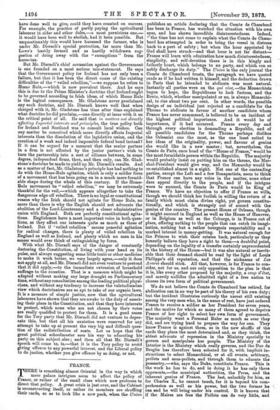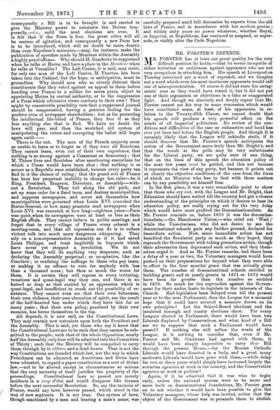FRANCE.
THERE is something almost Oriental in the way in which mere palace intrigues seem to affect the policy of France, or rather of the small class which now professes to direct that policy. A great crisis is just over, and the Cabinet is reconstructing itself, or rather its members are shuffling their cards, so as to look like a new pack, when the Union
publishes an article declaring that the Comte de Chambord has been in France, has watched the situation with his own eyes, and has shown incredible disinterestedness. Indeed, " the time has not come to explain what the Comte de Cham- bord has attempted in order to bring the vessel in distress back to a port of safety ; but when the hour appointed by God shall have struck—and that hour is not far distant— France will learn with admiration how much disinterestedness, simplicity, and self-devotion there is in this kingly and fatherly heart, which belongs to no party, and which can so nobly discharge its duty." The Union is the only journal the Comte de Chambord trusts, the paragraph we have quoted reads as if he had written it himself, and the deduction drawn in Paris that he intended to abdicate was most natural. Instantly all parties were on the qui vine, —the Monarchists began to hope, the Republicans to look furious, and the Rente, which, whether manipulated or no, is always Monarchi- cal, to rise about two per cent. In other words, the possible design of an individual just rejected as a candidate for the Throne to abdicate in favour of another candidate whom France has never summoned, is believed to be an incident of the highest political importance. And it would be of importance, if it had occurred. France every day and through every election is demanding a Republic, and of all possible candidates for the Throne perhaps dislikes the Orleanist one the moat, as the one least suited to her ideas of the originality, power, and flavour of genius she would like in a new master ; but, nevertheless, the Comte de Paris, once head of the "House of France," would be the most formidable person within the Republic. The majority would probably insist on putting him on the throne, the Mar- shal-President would give way, and the Monarchy would be re-established almost in a night. Not one of the contending parties, except the Left and a few Bonapartists, seem to think that France can have any voice in the matter, none other dare appeal directly to the people, and if the intrigue were to succeed, the Comte de Paris would be King of France. We have no objection to offer if France so wills, though we should think her foolish in willing the return of a family which must claim divine right, yet govern constitu- tionally, and which is strangely out of accord with the genius of the country. The present House of Orleans, though it might succeed in England as well as the House of Hanover, or in Belgium as well as the Coburgs, is in France out of place, offering nothing to the people that can catch its imagi- nation, nothing but a rather bourgeois respectability and a marked interest in money-getting. It was natural enough for the Princes to wish their estates back, particularly as they honestly believe they have a right to them—a doubtful point, depending on the legality of a transfer certainly unprecedented in the history of the House—but it was also natural or inevit- able that their demand should be read by the light of Louis Philippe's old reputation, and that the nickname of Les Avares should stick. All that, however, is for France to con- sider, not for us, and our only opposition to the plan is that it is, like every other proposed by the majority, a coup d'gtat, and merely nullifies the admitted right of a free nation to choose its own form of political government.
We do not believe the Comte de Chambord has retired, for abdication can in no way be part of his theory of his own duty; but the incident illustrates curiously the unrest still existing among the very men who, in the name of rest, have just ordered France to receive a soldier as her President for seven years, and the motive for which so many of them agreed to deprive France of her right to select her own form of government. The majority want a Personal Ruler as much as ever they did, and are trying hard to prepare the way for one. They know France is against them, so in the new shuffle of the cards they place the most determined and, as they think, the ablest advocate of repression in the Ministry specially to govern and manipulate her people. The Ministry of the Interior is the Ministry which really governs, and the Duc de Broglie has therefore been selected for it, with implicit in- structions to select Monarchical, or at all events, arbitrary, pre:fets and sous-prefets, and through them to educate the peasantry,—who, says the Duke, constitute France. This is the work he has to do, and in doing it he has only three opponents,—the municipal authorities, the Press, and the inherent genius of France. The last, unluckily for him, as for Charles X., he cannot touch, for it is beyond his com- prehension as well as his power, but the two former he can and he will bring under his control. It is known that if the Maires are free the Prefets can do very little, and
consequently a Bill is to be brought in and carried to give the Ministry power to nominate the Maires tem- porarily,—i.e., until the next elections are over. It is felt that if the Press is free, the great cities will all be centres of agitation, and consequently a new Press law is to be introduced, which will no doubt be more drastic than even Napoleon's measures,—may, for instance, make the publication of speeches made by Members within the Assembly a highly penal offence. Why should M. Gambetta be suppressed when he talks at Havre, and have a place in the iloniteur when he talks at Versailles ? The Left Centre, it is said, may resist, for only one man of the Left Centre, M. Fourtou, has been taken into the Cabinet, but the hope, or anticipation, must be groundless. Why should men who so utterly distrust their constituents that they voted against an appeal to them before handing over France to a soldier for seven years, object to appointing Maires by central authority, or to the suppression of a Press which advocates views contrary to their own ? They might by conceivable possibility vote that a suppressed journal should be compensated, having a genuine feeling for the pockets even of newspaper shareholders ; but as for protecting the intellectual life-blood of France, they fear it as they fear anything else that is Red. We have no doubt the laws will pass, and then the wretched old system of manipulating the voters and corrupting the ballot will begin again until— There is the rub. The men of the French majority seem as unable to learn or to forget as if they were all Bourbons. They cannot learn, even out of their own experience, that nothing is so strong against a Commune as democracy ; that M. Thiers lives and flourishes after sanctioning executions for which a Cesar would have been shot ; that nothing is so secure as a Republic once established, because every party can find in it the chance of ruling ; that the grand evil of France has been her perpetual inability to change her ruler—be it King, President, Emperor, Directory, or Assembly—with- out a Revolution. They toil along the old path, and set up some ruler for a fixed term, and destroy municipalities, and suppress newspapers, and never ask themselves how municipalities were governed when Louis XVI. convoked the States-General, or how many peasants read newspapers when Louis XVI. was executed, or how long—eighteen years—Paris was quietowhen its newspapers were at least as free as their English nvals. They cannot believe in public meetings, and forget that in every village of France every cabaret is a meeting-room, and that all repression can do is to reduce violent talk into much more dangerous whispering. They rely on a non-representative Assembly as if it had saved Louis Philippe, and trust implicitly in bayonets which have never yet stopped a revolution. We do not know that they will do anything very desperate, such as declaring the Assembly perpetual ; or co-optative, like the Conclave ; or confining the suffrage to those who pay taxes, or making it an offence to vote for anybody with less than a thousand acres ; but then so much the worse for them. It is certain they will repress in every irritating, vexatious and quasi-legal way they can, and there is no hatred so deep as that excited by an oppression which is quasi-legal, and insufficient to crush out the possibility of re- sistance. They cannot even see that their own bitterness, their own violence, their own ulceration of spirit, are the result of the half-hearted ban under which they have lain for so many years ; that their own policy, practised by their own enemies, has borne themselves to the top.
All depends, it is now said, on the Constitutional Laws. They may contain new restraints upon both the President and the Assembly. This is said, yet those who say it know that the Constitutional Laws are to be such that they cannot be sub- mitted to the people; such that of the whole Opposition, nearly half the Assembly, only four will be admitted into the Committee of Thirty ; such that the Ministry will be compelled to carry them through by la cleiture and a dead-heave. That is not the way Constitutions are founded which last, nor the way in which Frenchmen can be educated, as Americans and Swiss have been educated, to regard a paper constitution as a sort of divine law,—not to be altered except in circumstances so serious that the very necessity of itself justifies the propriety of the proceedings. Constitutional laws so passed are merely incidents in a coup d'aat, and would disappear like dreams before the next successful Revolution. So, say the enemies of France, would any laws, however passed, which stood in the way of new aspirants. It is not true. One system of laws, though sanctioned by a man and bearing a man's name, was carefully prepared amid full discussion by experts from the old laws of France, and in accordance with her modern genius ; and within sixty years no power whatever, whether Royal, or Imperial, or Republican, has ventured to suspend, or super- sede, or visibly alter the Code Napoleon.







































 Previous page
Previous page